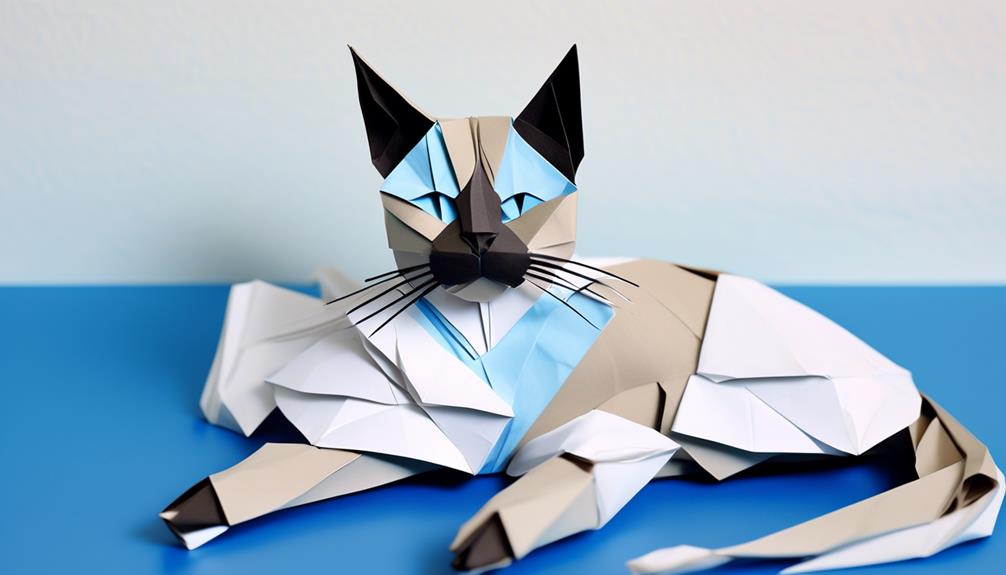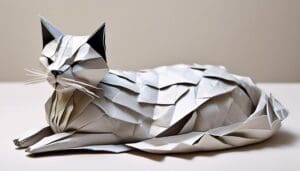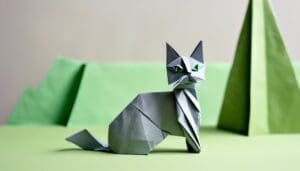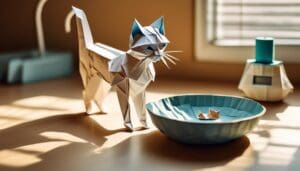As your cat enters their senior years, you may notice a gradual change in their vitality and perhaps a few more naps in the sun than in their youthful days.
Just like us, aging cats have specific dietary needs that are crucial to maintaining their health and well-being. You’re tasked with ensuring that their diet evolves to support their aging bodies, from optimizing protein intake to maintaining proper hydration levels.
The five key nutritional requirements for senior cats are a compass that can guide you through this journey, ensuring that your beloved pet receives the care they need to thrive in their later years.
Discover how to customize your cat’s diet to meet their specific needs, enhancing their quality of life in a way all pet owners want to achieve.
Key Takeaways
- Ensure senior cats receive enough high-quality protein to preserve muscle mass and mitigate risks of chronic kidney disease.
- Balance omega fatty acids in the diet to manage inflammatory diseases and cognitive function.
- Monitor hydration levels and provide fresh water and high-water content senior cat food to keep cats hydrated.
- Consider the importance of vitamins and minerals, such as vitamin E and C, for cell protection and manage calcium/phosphorus ratio and dietary phosphorus for bone and renal health.
Optimizing Protein Intake
As your cat enters their golden years, it’s essential to ensure they’re getting enough protein to preserve their precious muscle mass. Senior cats face the challenge of the aging process, which can lead to a loss of lean body mass. To combat this, you must focus on their protein requirements, ensuring their diet includes high-quality protein that’s easily digestible.
Consult with a veterinarian to determine the best protein diet for your aging cat. They can provide guidance on nutritional interventions that support lean body mass and overall health.
The ideal protein levels for mature adult and senior cats should be moderate, between 30-45% dry matter. This balance helps mitigate the risks associated with chronic kidney disease, a concern for many senior felines.
Managing Dietary Fats
While optimizing protein is crucial for your aging cat’s muscle health, it’s equally important to manage dietary fats to ensure they maintain a healthy weight and robust immune system. As you lovingly care for your cat, consider the following:
Balancing Omega Fatty Acids:
- Omega-3 fatty acids, often found in fish oil, are vital for managing inflammatory diseases and supporting cognitive function.
- Omega-6 fatty acids are equally important but should be balanced with omega-3s to prevent negative health effects.
Monitoring Energy Intake:
- Energy density of foods should be appropriate for your cat’s energy needs, avoiding excess caloric intake that can lead to obesity.
- Higher protein and dietary fiber can help manage weight while maintaining a complete and balanced diet.
Ensuring Digestibility:
- Select foods with fats that are easily digestible to aid your senior cat’s digestive health.
- Monitor phosphorus levels, particularly if your cat has kidney issues, as this can impact overall health.
Consulting with a veterinarian helps tailor your aging cat’s diet to their unique needs. By managing dietary fats thoughtfully, you’re providing a precious gift of health and happiness to your cherished pet.
Ensuring Hydration Levels
Ensuring your aging cat stays properly hydrated is as essential as a balanced diet for their overall health and well-being. Aging cats, particularly those with kidney function concerns or urinary tract disease, require ample fresh water to support their hydration levels and help manage their nutritional needs.
| Factor | Benefit for Aging Cats | Tips to Encourage Hydration |
|---|---|---|
| Freshness of Water | Keeps water appealing | Change water daily |
| Water Content in Senior Cat Food | Increases water intake | Offer canned food |
| Variety of Water Containers | Satisfies preferences | Provide different bowls |
| Supportive Environment | Encourages drinking | Keep bowls in quiet areas |
As your cat ages, their body’s ability to manage hydration can diminish. Renal disease, often seen in senior cats, makes maintaining proper water intake even more crucial. Protein-rich senior cat food should be balanced with sufficient water to prevent dehydration.
Remember to observe your cat’s behavior. Do they prefer a particular type of bowl or a running water fountain? Small changes can make a big difference in their water consumption. It’s not just about providing water; it’s about making hydration a comfortable and easy choice for your beloved cat.
Balancing Vitamins and Minerals
Just as fresh water plays a crucial role in your aging cat’s health, a balanced intake of vitamins and minerals is equally vital to cater to their changing nutritional needs. As caregivers, it’s our duty to ensure our feline friends are supported through their golden years with the right nutrition.
Vitamins and Antioxidants:
- Vitamin E helps protect their cells against oxidative damage.
- Vitamin C, although not required in the feline diet, can be beneficial under stress or illness.
- The Effects of dietary antioxidants on the progression of renal disease are a focus of ongoing research.
Minerals:
- The calcium/phosphorus ratio must be managed to prevent bone health issues.
- Dietary phosphorus control is crucial, especially with the progression of renal disease.
Special Considerations for Aging Cats:
- Geriatric cats have modified nutritional requirements that can include increased vitamins and minerals.
- Awareness of aging in cats and associated conditions like feline degenerative joint disease is essential for dietary adjustments.
Supporting Joint and Cognitive Health
To support your aging cat’s joint and cognitive health, consider cat foods enriched with omega-3 fatty acids and key antioxidants like vitamins E and C. These nutrients are vital in promoting healthy aging and are particularly beneficial for pets like senior cats, whose needs evolve over time. Long-chain omega-3 fatty acids are known to help maintain joint health, which can be meaningful for cats with osteoarthritis.
Understanding that the golden years can bring challenges associated with aging, you want to ensure your cat continues to thrive. Glucosamine and chondroitin are also important ingredients to look for in therapeutic diets; they’re known for their ability to support joint health and mobility.
Frequently Asked Questions
What Are the Nutritional Requirements for Senior Cats?
You’re looking to nourish your senior cat with love and care. They’ll thrive on a diet rich in highly digestible protein, essential fats, and antioxidants to support their health in their golden years.
What Is the Best Food for Aging Cat?
For your cat’s well-being, opt for a high-protein, low-carb diet enriched with vital nutrients to enhance their senior years.
What Nutrition Does an Adult Cat Need?
Your adult cat needs a balanced diet rich in protein, vitamins, and minerals to stay healthy. Ensure they’re getting enough taurine, omega fatty acids, and are hydrated with fresh water daily.
What Should I Feed My Cat at What Age?
Feed kittens under 4 months old specially formulated kitten food 3-4 times a day. From 4 months to 1 year, continue with kitten food but reduce to 2-3 times daily. Adult cats (1-7 years) should have quality adult cat food twice daily. Senior cats (7+ years) may need specific diets based on health.




